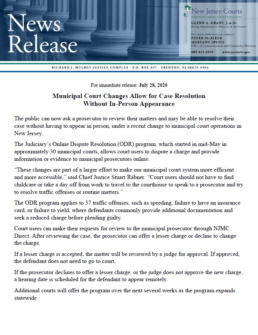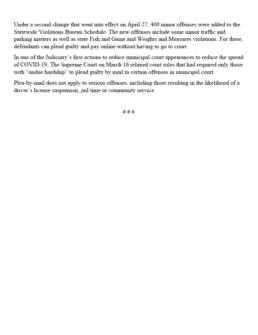Municipal Court
Office Hours: Monday – Friday, 9:00 A.M. – 4:00 P.M
Telephone: (201) 585-4115
Fax: (201) 944-6129
Certified Municipal Court Administrator: Serina Ruberto
Municipal Court Judge: Joseph J. Rotolo
Municipal Prosecutor: E. Carter Corriston Jr.
Municipal Public Defender: Marc Macri, Esq.
Helpful Links / Forms:
- Plea by Mail : https://www.njcourts.gov/sites/default/files/forms/10715_plea_mail.pdf
- Your Day in Court : https://www.njcourts.gov/forms/10959_yourdayincourt_8x11.pdf?c=vbt
- Municipal Court Opening Statement : https://www.youtube.com/watch?v=y_zJg-XLde0
- Do I qualify for a Public Defender : https://www.njcourts.gov/sites/default/files/forms/10110_muni_5a.pdf
- Where may I pay my fine? www.NJMCdirect.com
- Municipal Court Appeal Forms : https://www.njcourts.gov/forms/10559_muni_appeal_kit.pdf?c=QQ0
- Court Fines : https://www.njcourts.gov/courts/adult-probation-supervision/fines
- NJ Motor Vehicle Commission Point Schedule : http://www.state.nj.us/mvc/Violations/penalties_pointSchedule.htm
- Records Request Application Form Online at https://www.njcourts.gov/selfhelp/index.html
Municipal Court sessions will now be conducted virtually/remotely to minimize exposure to COVID-19. Accordingly, all complainants, defendants, attorneys, victims are to contact the municipal court via email at palisadesparkmunicipalcourt@gmail.com or at (201) 585-4115 to provide your full name, e-mail address, and cell phone number within seven days of a court notice.
Court is held on the First, Second, and Third Thursday of each month and begins at 4:00 P.M.
Tickets can be paid through the website offered by the Judiciary which is www.njmcdirect.com and by mail or in person at the violations window located in the Borough Hall.
Please Note: Certain traffic offenses are not payable and the defendant must appear in court. Please do not hesitate to call the violations bureau if you have any questions or are unsure of how to proceed and/or how to enter your plea.
Any questions relating to court dates, adjournments or any other inquiries should be directed to our office staff at (201) 585-4115.
All court personnel are fully trained professionals and will be happy to answer all procedural questions that you may have, but cannot give legal advice.
Frequently Asked Questions:
1. What is the Municipal Court?
It is through the Municipal Courts that most citizens in the State come into contact with the judicial system, either as a defendant, a victim, or a witness. The Municipal Courts in New Jersey are considered courts of limited jurisdiction, having responsibility for:
- Minor criminal-type offenses (for example, simple assault and bad checks)
- Motor vehicle and parking tickets
- Municipal ordinance offenses (such as dog barking or building code violations)
- Other offenses, such as fish and game violations
A Municipal Court usually has jurisdiction only over cases that occur within the boundaries of its municipality. Many serious criminal cases, such as robbery, auto theft, or assault, start out as complaints filed in the Municipal Court, but those cases are transferred to the Superior Court located at the county courthouse.
2. What are my rights as a defendant in the Municipal Court?
- You are presumed to be innocent until proven guilty beyond a reasonable doubt.
- You have the right to be informed of the charges against you.
- You have the right to remain silent concerning the charges against you, and anything you say may be held against you.
- You have the right to retain an attorney.
- You have the right to be assigned an attorney if the judge determines that you cannot afford an attorney, and there is a likelihood that if you are convicted, you will either go to jail, receive a substantial fine or your driver’s license will be suspended.
-
You have the right to request a reasonable postponement so that you may have an opportunity to consult with your attorney and prepare a proper defense.
-
You have the right to testify or not to testify on your own behalf.
-
You have the right to call or subpoena witnesses to testify on your behalf.
- You have the right to appeal within 20 days of any conviction.
If you think you need the services of an interpreter, please notify the Municipal Court Administrator prior to your appearance in court.
3. Do I need to appear in court if I choose to plead guilty and pay the fine?
If the “Court Appearance Required” box has not been checked on the complaint and if the charge is listed on either the Statewide Violations Bureau Schedule or the Local Violations Bureau Schedule, you may pay the fine without appearing in court. The Statewide Violations Bureau Schedule is a list of state offenses that may be paid without going to court. The Local Violations Schedule is a list of municipal ordinances that may be paid without going to court.
You may pay your fine at the court’s payment window, by mail, or pay your fine online. If you pay without going to court, you will be pleading guilty and giving up your right to a lawyer and your right to a trial. Court appearances are always required in criminal matters.
Note: Payments are due by the date at the bottom of the Summons. The date on the bottom of your ticket is not necessary for your court date – please read the back of your summons. If you are not sure, please contact the Court. If you have received a paperwork violation notice, you must still appear in court.
4. If I can plead guilty without going to court, how much will I have to pay?
The amount of the fine is in the Statewide or Local Violations Bureau Schedules. These schedules are available for review at the Municipal Court Office. The Statewide Violations Bureau Schedule is also posted on the New Jersey Courts website,
5. How many points is my ticket?
Please do not question the Municipal Court about points – they are not assessed by the Court, they are assessed by the State of New Jersey. Please view the New Jersey Motor Vehicle Commission website’s New Jersey State Law Points Schedule, or contact Motor Vehicle Services directly,
6. What should I expect when I go to court?
- Prior to entering the courtroom, please turn off or silence your phone or pager.
- When you get to court, check in with court staff.
- Listen to instructions from court staff and from the judge. The proceedings are sound recorded, so please remain quiet until it is your time to speak.
- The judge will give an opening statement explaining court procedures, defendants’ rights and penalties.
- Cases are usually called in the following order:
- Requests for postponements
- Uncontested motions
- First arraignments
- Guilty pleas
- Contested motions
- Pleas of not guilty (with attorney)
- Pleas of not guilty (without attorney)
- A case may be postponed to give you time to obtain representation by a private attorney or by a public defender (if you qualify) and prepare your defense. If you need a postponement, ask the court staff for assistance.
Mediator
If your case involves a dispute between you and another person, you may be required to participate in a discussion with a mediator to attempt to settle.
7. What is a plea agreement?
A plea agreement is a way to settle a case. Plea agreements are negotiated with the prosecutor, an attorney who represents the state. You will be given the opportunity to speak to the prosecutor to try to settle your case. You are not required to speak to the prosecutor. All plea agreements must be approved by the judge.
8. What happens if I plead guilty in court?
If you plead guilty in court, the judge will ask questions regarding the offense charged to make sure there are facts to support the guilty plea and to determine that your plea is voluntary. The judge will then make a finding and impose a sentence. If you plead guilty or are found guilty of traffic offenses in court, the penalties listed on the Violations Bureau Schedule do not apply.
9. What if I plead not guilty?
If you plead not guilty, the judge will preside over a trial to determine whether you are guilty or not guilty. The trial may be held that day, but in certain circumstances, it may be rescheduled. In a trial, the prosecutor first will call the
state’s witnesses (witnesses against you). They will answer the prosecutor’s questions and present any other evidence they have. When the prosecutor is finished with each witness, you, or your attorney, will be permitted to ask them questions about their testimony.
When the prosecutor’s case is complete, it will be your turn to call witnesses and present evidence on your behalf. You may testify, although you are not required to do so. If you testify, the prosecutor can ask you questions (cross-examine you). After all witnesses and evidence have been presented, the judge will decide whether you are guilty or not guilty. If you are found guilty, the judge will impose a sentence.
10. Can I use the Internet to find more information or to plead guilty and pay a fine?
Yes. For certain offenses, where a court appearance is not required, you can find out the total amount that you must pay if you plead guilty and pay through the New Jersey Courts website. You can obtain more information about the municipal courts and other parts of the New Jersey Judiciary at New Jersey Courts.
11. If I am found guilty, what happens after court?
You will be required to pay all monetary penalties, as ordered by the judge. Under certain circumstances, the court may permit you to pay over a period of time. You will be given instructions on how to comply with any other parts of your sentence.
12. How can I appeal a decision of the court?
If you disagree with the judge’s decision, you may appeal, but if you appeal, you must file the appeal within 20 calendar days of your conviction. You will be required to pay a deposit that will be applied against the cost of preparing a transcript of the trial. You also will be required to pay a $75 filing fee. Please download a copy of the municipal court le appeals packet, How to Appeal a Decision of a Municipal Court (PDF)”. Information on representing yourself in an appeal is also available at the Judiciary’s website.
Appeals from the Municipal Courts are heard at the county level in the Superior Court, Law Division. The Superior Court Judge reviews the transcript (produced from the audio recording of the trial) and any other evidence or legal papers from the trial and makes a decision regarding the case. New testimony or evidence are generally not admitted for the appeal.
13. What happens when the court's orders are not obeyed?
People who do not come to court when summoned or subpoenaed, make payments as required, or comply with other requirements of their sentences, face additional punishments including fines, drivers’ license suspensions, arrest and jail.
14. What is mediation?
Mediation is a process that seeks to resolve disputes through the intervention of a trained mediator, without pursuing a matter through the courts to trial and conviction. The mediator encourages discussions between the parties to help them reach an agreement they can both accept. The types of complaints sent to mediation generally include citizen complaints involving disputes between individuals or groups. These are commonly referred to as “neighborhood disputes.” Not all complaints can be referred to mediation. For example, motor vehicle matters and criminal matters cannot be resolved using the mediation process.
Benefits
Mediation offers benefits, including:
- Establishing early, direct communications and understanding between the parties about the important issues of each side.
- The result may benefit all of the parties and provide a win-win solution.
- Mediation can be less expensive, more relaxed and a more meaningful alternative to the traditional trial process.
Mediation is available in nearly all municipalities and is made possible largely because of the efforts of trained volunteers who are the mediators..


